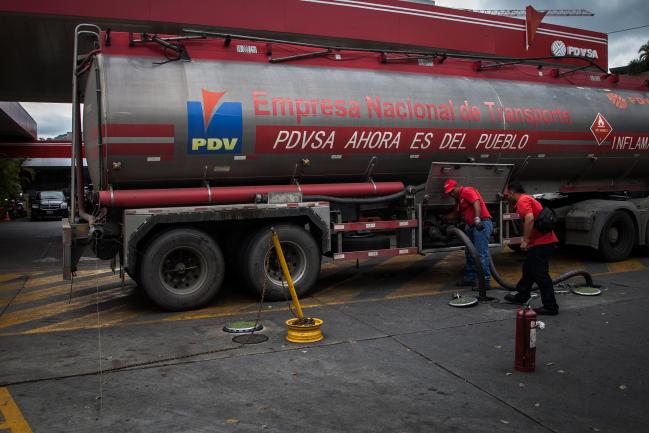(Bloomberg) -- Venezuela’s state-run oil company said it transferred the funds to make an $842 million principal payment on its bonds due Friday, overcoming the first of many hurdles the country will face in coming days as it seeks to avoid sinking into default.
The announcement spread a sense of relief to investors in the bond market, who drove up Venezuelan asset prices across the board Friday. A second big payment is due Nov. 2, and the country’s decision to disburse the cash for today’s payment indicates that it likely intends to meet that one too.
But plenty of obstacles remain, including the immediate challenge of ensuring that the cash makes it all the way into the accounts of creditors. In recent weeks, Venezuelan officials told investors that less-critical interest payments have gotten held up in the payment chain because U.S. sanctions on the government scared many international banks into refusing to take part in the cash transfers.
“Given logistics and steps needed to get payment to bondholders, I doubt that the money will arrive by the end of today,” said Ray Zucaro, the chief investment officer at Miami-based RVX Asset Management. “Monday is more realistic, and then we will hear a big sigh of relief.”
While Petroleos de Venezuela SA said it made the principal payment on amortizing notes due 2020, there was no reference to the $107 million of interest due at the same time. The company and government have been using grace periods on more than half a billion dollars of such payments due this month, but the principal amount Friday had no such buffer. It’s next big challenge is the additional $1.2 billion owed on notes maturing next week.
“I don’t think we’ll sweat as much going into November 2, given the fact that they’ve made this amortization payment,” said Siobhan Morden, who heads Nomura Securities International’s Latin America fixed-income strategy. Missing the interest owed “reaffirms the coupon watch and concerns that they continue to struggle to make these payments.”
A default for PDVSA could have potentially been disastrous at a time when access to credit has already been severely curtailed, refineries are running at less than half of their capacity and oil output has tanked to less than 2 million barrels a day. Venezuelan President Nicolas Maduro has insisted that his government will continue to honor its international obligations even as he curbs imports to save cash for debt payments, causing shortages of goods to worsen in a nation already suffering a deep recession and hyperinflation.
PDVSA “confirms its full solvency and capacity to fulfill its commitments, despite the economic war and the imposition of unjustified sanctions from Donald Trump,” the oil firm said in its statement.
The notes due 2020 jumped 3.5 cents to 85 cents on the dollar as of 12:27 p.m. in New York, while the securities due next week climbed to a three-year high of 95.8 cents. Sovereign bonds due in 2027 leaped 9.6 percent to 36.9 cents on the dollar.
To be sure, there are plenty of Venezuela watchers -- including economists such as Ricardo Hausmann -- who have been urging the government to stop payments. They say the debt load is unsustainable, and sending dollars to foreign investors while cutting back on imports of food, medicine and basic goods for the Venezuelan people is immoral.
Click here to read how Venezuela got into this mess
The government and PDVSA will owe international creditors $10 billion in bond payments next year and $14 billion in 2019, according to Capital Economics. International reserves have sunk to a 15-year low near $10 billion.
“It remains a question of when -- not if -- PDVSA and the government default,” analysts at the research firm said in a note Friday.
If PDVSA makes the pending payments through next week, Venezuela should have a smooth ride until its next hefty chunk of payments come due in April 2018, according to Jan Dehn, the head of research at London-based Ashmore Group Plc, which oversees about $58 billion of assets and is the largest reported holder of PDVSA’s 2020 and 2017 bonds.
“They were saving up to make these very large payments,” he said.
